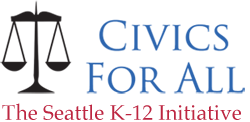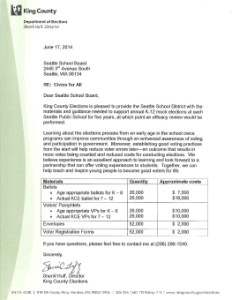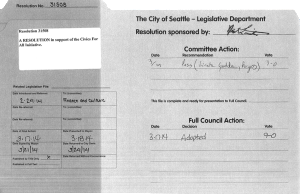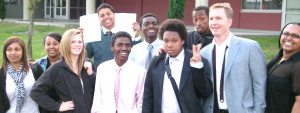THE TIME IS NOW TO FINALLY INTEGRATE CIVICS INTO SPS’S K-12 CURRICULUM BY MAKING ANNUAL K-12 MOCK ELECTIONS A REQUIREMENT!
THE DECLINING STATE OF SEATTLE PUBLIC SCHOOLS AND THE GROWING THREATS TO OUR DEMOCRAY DEMANDS IT!
ABUNDANT EVIDENCE PROVES THAT ANNUAL MOCK ELECTIONS ARE THE PERFECT CENTERPIECE FOR REVIVING RELATED CIVICS BASED LESSONS AND FOR CONNECTING THE CLASSROOM TO THE LIVING ROOM AND COMMUNITY! PLUS, KIDS LOVE PARTICIPATING IN THEM!
2018 BALLARD MOCK ELECTION PILOT RESULTS
In 2018, Ballard High School ran a pilot all school mock election funded by King County Elections’ indomitably education committed director Julie Wise. The results reveal just how much kids love and learn from voting and the voter education curricula that supports actually getting in line at our school ballot table and filling in the ballot and dropping it in the box!!!
The 2018 Ballard High Mock Election was a tremendous success!
Students and teachers alike loved the process of studying initiatives and races and voting. In this opt-in election, 1278 paper ballots were turned in (63.9% turnout) and 837 students voted and took an election survey on the overall educational process on the district’s Schoology platform (see all the poll/survey results here).
The anonymous Schoology student data feedback highlights speak volumes about the value of adopting mock elections at all Seattle schools:
91% YES ““ Question 5: “Was having the opportunity to participate in this first ever BHS mock election and the democratic process a valuable learning experience for you?”
83% YES ““ Question 6: to more or much more time spent on the process: “If you were to participate in another mock election in a future social studies class, would you like to spend more or less time studying the initiatives and learning about how to vote?”
89% YES ““ Question 7: “Do you think participating in this mock election will make you more likely and ready to vote in real elections when you turn 18?”
67% YES ““ Question 9: “Did your social studies teacher assign you and your classmates to interview your parents about the election initiatives?”
King County Elections (KCE) did the publishing for Ballard’s 2018 mock election, including fancy, “authentic” ballots and Student Voter Pamphlets for each of Ballard’s 2000 students.
The benefits of doing so are many: a few are listed below but are not limited to:
- A grade K-12 mock election program would make total and instant sense to students, teachers, parents, and community members. Plus, curriculum for it is abundant, diverse, easy to access, and easy to customize to particular classroom/school needs and desires.
- The available K-5 curriculum for mock elections is somewhat elusive and could/would require elementary teachers to do more work putting them together than grade K-12 teachers, which would be unfair.
- Eliminating elementary teachers and schools (many of whom will still likely participate in voter education/participation activities nonetheless) from the proposal makes the program much more clean, clear, and manageable since there has always been a clear split between ele. and sec. ed.
- Among the ranks of the approximately 275 middle and high school grade K-12 social studies teachers, support is already predictably strong. Many, many, many middle and high school teachers already supported Civics for All’s annual mock elections program in the sample taken 10 years ago in 2015 – including 40 SPS HS SS teachers and 55 SPS Admin., teachers, and staff
- I think it is important to note and honor the fact that 9 long years ago, on Feb. 8, 2016, SPS’s own Kathleen Vasquez publicly and formally announced her support for SPS to adopt Annual 4-12 Mock Elections, along with a slew of related civics adoptions/materials. I have been in correspondence with her and she still supports mock elections and civics.
IN THIS TRAGIC ERA OF INCREASINGLY NORMALIZED AUTHORITARIAN POLITICS, AS MASKED ICE AGENTS ABDUCT AMERICAN CHILDREN IN MIDNIGHT RAIDS, FEDERAL JUDICIAL DECISIONS ARE REGULARLY IGNORED, AND INCOME GAPS AND FEDERAL DEFICITS ARE EXPLODING, HARVARD REPORTS THAT, UNSURPRISINGLY, “64% OF YOUNG AMERICANS HAVE MORE FEAR THAN HOPE ABOUT THE FUTURE OF DEMOCRACY IN AMERICA.” WE SHOULD IGNORE THEIR FEARS NO LONGER IF WE TRULY CARE ABOUT EMPOWERING THEM TO PARTICIPATE IN SAVING OUR COLLAPSING DEMOCRACY.
FOR WELL OVER A DECADE, AN HONOR ROLL OF SEATTLEITES HAVE ASKED THAT THE DISTRICT ADOPT THE CIVICS FOR ALL INITIATIVE AND ITS ANNUAL K-12 MOCK ELECTIONS CENTERPIECE (SEE THE CURRIC. IN THE WHITE COLUMN TO THE RIGHT).
HOWEVER, WHILE MULTIPLE SPS SCHOOL BOARDS HAVE UNANIMOUSLY ENDORSED CFA, SPS’S SHORT TENURED STRING OF SUPERINTENDENTS HAVE REPEATEDLY FAILED TO IMPLEMENT REQUIRED ANNUAL K-12 MOCK ELECTIONS.
IN FACT, SPS SUPERINTENDENTS EVEN TURNED DOWN A $250,000 GRANT FROM KING COUNTY ELECTIONS THAT WOULD HAVE FUNDED A 5 YEAR IMPLEMENTATION PLAN OF ANNUAL K-12 MOCK ELECTIONS IN ALL SPS SCHOOLS.
AGAIN, GIVEN THIS HISTORY, SEATTLITES AND THEIR SCHOOL BOARD REPRESENTATIVES MUST INSIST THAT OUR NEXT SUPERINTENDENT IS CONTRACTUALLY COMMITTED TO IMPLEMENTING K-12 MOCK ELECTIONS. UNSURPRISINGLY, ANNUAL K-12 MOCK ELECTIONS ALIGN PERFECTLY WITH MANY OF THIS STRATEGIC PLAN’S COMMUNITY ENGAGEMENT AND EQUITY GOALS, AND MUCH MORE.
Since Web Hutchins’ Franklin High Public Service and Political Science students first testified on behalf of the initiative in 2011, Seattle’s Civics for All’s Initiative has attracted the hopes of many Seattlites who want our public schools to do a better job of educating our students for participation in our democracy. From former state director of OSPI Judith Billings (who is the co- director of CFA), to Mayor Bruce Harrel, to the incomparable Erin Jones, to virtually every state legislator in the region (including Majority Leader Frank Chopp [RIP]), essentially everyone is waiting for SPS to finally adopt and incorporate a required civics rich K-12 curriculum like the Civics for All Initiative.
SPS veteran high school history and English teacher, Web “Hutch” Hutchins (1990-2020), now retired, founded the Civics for All Initiative in 2011 at Franklin High. The core/centerpiece of democracy, and of the CFA proposal, is voting in fair and free public elections.
The annual K-12 mock election voting requirement increases students’ sophistication in the broad range of civic skills that educated voting decisions demand. Core elements of the annual mock election are outlined at right in the white column as well as in other areas of the website and via King County, the State, and innumerable other websites.
The WA Sec. of State offers a superb K-12 mock election voting website and materials which teachers can customize for their own students, although its grades K-4 offerings are a bit meager, they and the civics ed community nationally have built and are building quality K- 4 mock election/voting education materials wherein children develop their understanding of concepts like community, choice, representation, etc.
Just picture it: Seattle’s civic life will POP each fall as 50,000 students from 97 schools select candidates and choose sides within their families on the issues, ideas, and initiatives of the day! Doing so will help ALL Seattle 18 year olds respond with a resounding “YES” to the New York Times recent query: “When You Are Old Enough to Vote, Will You?”
Adopting annual K-12 mock elections will be a PR boon for the Seattle School District and will build good will city-wide — it has been absolutely embraced by the city of Seattle. And adopting and implementing this program will likely not only bring statewide attention to Seattle, but the Emerald City will likely become a nation model for K-12 voter education in a major urban school district.
Finally, it is crucial to note that participation in mock elections helps fill the character education gap in our District’s strategic plan: Annual voting, accompanied by intentional use of a core set of Essential Civics Questions provides for recursive, ever deepening analysis of civic virtues – like the Common Good, civic duty, tolerance, honesty, respect for truth, responsibility, fairness, patriotism – that voting and participating in free and fair elections entails.
The Program:
While there are a full range of options and add/ons to running annual mock elections (as outlined throughout this website and in the white column at right), we are not asking that the district adopt the full Civics for All Initiative, although it would be wise to do so.
Rather, we are simply seeking a district commitment from the school board and the new Superintendent to institute the K-12 annual mock elections. They can add on whatever other options they see fit (for an example, see SPS Social Studies Coordinator Kathleen Vasquez’s 2016 CFA adoption recommendation by Kathleen Vasquez, to implement most of the proposal.)
The easiest way to institute annual K-12 elections is by using the Washington Secretary of State’s SOS K-12 Mock Election website (see SOS grade 5-12 Teacher Resources here) where all the materials are provided, including authentic ballots, voter’s pamphlets, etc.
CFA proposes that ALL schools, All communities, and ALL students will gain in innumerable ways by participating annually in district-wide K-12 mock elections, It takes a formal district policy adoption to institutionalize and guarantee that policies are instituted with fidelity over the long haul as administrators and teachers cycle through our system.
Funding:
The chief expense in funding mock elections is photo-copy expenses and how the district and its teachers want to approach that is up to them. If classes have functioning computers for each student they could do it all online.
However, in many teachers’ experience, using actual paper ballots is very worth it. Also, the state “Voter’s Pamphlet” is much more handy when each student can have a whole pamphlet and can write in it and share it with friends and family. Plus, photocopying off entire 50 page pamphlets at each school is not efficient or effective.
KCE has provided them in the past for free on a single school basis after the district rejected the quarter million dollar grant, the bulk of which would have funded voters pamphlets for five years for approximately 34,000 grade K-12 SPS students. Perhaps SOS will be able to fund providing these pamphlets – if not certainly the district could round up local orgs to help fund these expenses.
The investment in extending the quality of the learning experience can take some financial investment – say in items like classroom civics banners (see items 2,3, and 5 in the white column at right for examples) – but it is peanuts and could be easily found in Seattle’s vast wealth and philanthropic tradition.
Again, to get a rough budget framework see SPS Social Studies Coordinator Kathleen Vasquez’s 2016 CFA adoption recommendation by Kathleen Vasquez, to implement most of the proposal. Also, there is a circa 2015 Budget Proposal on this website here.
Time Spent on Mock Elections:
- On average it takes only five class periods (5 hours) to implement a K-12 mock election though individual teachers can easily spend up to 10 class periods of pedagogically rich time on the process. See “The Curriculum: Civics for All and Mock Elections in SPS – 5-10 Class periods” and other materials at this link here.
- An example of how powerful SPS mock elections can be is below.
Educating young people to grow up to become active voters, especially youth of color and/or low income backgrounds, requires a vertically integrated curriculum that keeps attuned to democratic processes year round, ideally, but at least at every election season. Civics for ALL aligns directly with each of the District’s goals regarding equity and ending the opportunity gap. See below.
Citizens seem most excited by the Initiative’s proposed city-wide mock elections in which 50,000 scholar citizens will annually participate in democracy’s most sacred act: VOTING! Research by CIRCLE “shows emphasizing elections in civics classes has a (long-term) positive impact on political knowledge and voting.” If Superintendent Banda endorses the Initiative, King County Elections and the Secretary of State’s office have both committed to helping facilitate a student-friendly experience, with KCE providing customized, age-appropriate voter’s pamphlets, ballots,and voter registration materials and SOS providing on-line voting and detailed statistical voting analysis. Abundant research proves that when we teach youth the civic values, habits, and skills of citizenship they vote at much higher rates and tend to become voters for life.
Background CFA history:
On March 17, 2014 the Seattle City Council and King County Council passed tandem “Resolutions of Support for the Civics for All Initiative.” As the embodiment of local, direct democracy and the representative voices for millions of voters, the 9-0, 9-0 unanimous votes of these Councils signifies a tremendous affirmation of support for the Seattle School District to adopt Civics for All in our city’s schools.
Further, in 2014 CFA received
Unanimous school board support from:
Grace Mack, Seattle School Board Director, District 4
Leslie Harris, Seattle School Board Dir., District 6
Jill Geary, Seattle School Board Dir., District 3
Rick Burke, Seattle School Board Dir., District 2
Scott Pinkham, Seattle School Board Dir., District 1
Betty Patu, Seattle School Board Dir., District 5
Rick DeWolf, Seattle School Board Dir., District 7
Despite this vetting, including the bold support of Kathleen Vasquez, the school district’s social studies coordinator, to implement most of the proposal, the Seattle School Board was distracted by more superintendent turnover and failed to act on adoption of CFA in 2014 or 2015.
School board support has grown tremendously over the years, pioneered by SB President Sharon Peaslee, Marty McClaren, and Sue Peters.
Current School Board Directors Supporting CFA (Feb. 2015)
- Sue Peters, Seattle School Board Director, District 4
- Leslie Harris, Seattle School Board Dir., District 6
- Jill Geary, Seattle School Board Dir., District 3
- Rick Burke, Seattle School Board Dir., District 2
- Scott Pinkham, Seattle School Board Dir., District 1
- Betty Patu, Seattle School Board Dir., District 5
- Opposed, Stefan Blanford, Seattle School Board Dir., District 7
Also, many of the other leading candidates in the 2015 fall school board race declared their support for Civics for All, including Lauren McGuire and Michael Christophersen.
Then, in 2016, under yet another new superintendent, the only school board member ever known to have publicly opposed CFA – Stefan Blanford – repeatedly and steadfastly refused to join his 6 colleagues in endorsing CFA and allowing it to be adopted.
Blanford’s opposition and superintendent disinterest steered the school board in 2016 to decide to not guarantee ALL students the right to participate in mock elections and instead proposed to support “optional, annual mock elections,” even though mock elections are already optional. Sadly, this decision rejected the Civics for All centerpiece – required universal K-12 mock elections at all schools – as well as the Initiative’s widely vetted civics-based, voter education curriculum and media literacy/political literacy component.
Why the School Board, which had openly voiced support for Civics for All Civics all along, opted for such a scaled-back approach is, again, unclear. It is true though that all curriculum adoptions take time.
The board’s ostensible commitment to “support optional voting” has seriously failed to provide ALL children equal access to learning about the electoral process in our democracy. In fact, under the district optional plan less than 4000 SPS kids voted via the prescribed Washington Secretary of State’s Youth Votes website in the 2016 election. If Civics for All had been instituted with K-12 required elections for all, 54,000 students would have voted and engaged in the process with their families and communities. But 50,000 students were denied the right to learn about that very significant election and every election since.
The board’s “optional voter education” decision was a huge disappointment for Civics for All supporters across Seattle, where equity is the byword of democracy and education. Indeed, equity is the core value and objective of our district’s Strategic Plan and over 20 other plans, priorities, and policies.
Through the years, Seattle’s school board has exuded a passion for kids, education, and social justice. Their obvious faith in the unbreakable bonds between education and democracy is reassuring, yet it also makes unclear the delay in formally adopting a strong voter-education program like Civics for All. Evidence suggests the ever-changing superintendents have been a primary blockage to mock elections adoptions.
Amazing Legislative Supporters and Others
On March 17, 2014, the Seattle City Council and King County Council both unanimously voted to adopt and issue co-Resolutions of Support for the Civics for All Initiative. KCC Chair Larry Phillips and SCC members Bruce Harrell and Nick Licata sponsored the resolutions. Also supporting the proposal: numerous Washington State Legislators, including Eric Pettigrew, Sharon Tomiko-Santos, Reuven Carlyle, Adam Kline, Bob Hasegawa, Jeanne Kohl-Welles, and Eileen Cody; numerous Secretary of State staff, including Sec. Kim Wyman and former Sec. Sam Reed; leading education professors from Seattle U., the UW, UVA, and Stanford; organizations like CityClub; and teachers and citizens from all around the district and city.







